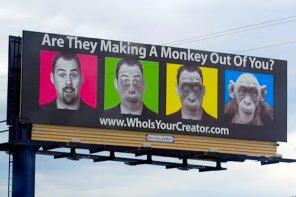Everybody needs to sit back and relax. In this anniversary year of both Charles Darwin’s birth and his magnum opus, we shall surely hear even more than usual about this brilliant and thinking man whose ideas changed the world forever. Let’s celebrate and learn from him, whether we agree with him or not, rather than use his ideas as kindling for the ‘the culture wars between science and religion.’ I know: kindling and fires sell books—but let’s relax and go a bit deeper.
In The New Republic, Jerry Coyne, a respected professor of ecology and evolution at the University of Chicago, reviews two books that attempt to reconcile science and religion: Karl Giberson’s Saving Darwin: How to be a Christian and Believe in Evolution (HarperOne, 2009) and Kenneth Miller’s Only A Theory: Evolution and the Battle for America’s Soul (Viking, 2009). Coyne’s own contribution to the conversation was also just published, and its title is self-explanatory: Why Evolution Is True (Viking, 2009).
It takes him a long time to say it, but Coyne’s main point is that however hard Giberson or Miller or anyone else tries, they will never be able to reconcile science and religion, because science and religion are irreconcilable. Coyne does an admirable job of demonstrating this, point by (now tiresome) point.
First, there’s the usual collection of statistics illustrating Americans’ stupidity (74% of us believe in angels, and most of us in miracles, etc.); so, clearly, we need help, and the implication is that science will provide this help if only we were more rational, for God’s sake.
Then, there’s the God-of-the-gaps argument and why it’s so weak. God-of-the-gaps goes like this: science can explain everything except blank (depending on the historical moment, fill in the blank with: how the earth moves around the sun, why we look like our parents, why the proteins in a bacterial flagellum work the way they do, why only humans can write columns like this), so God must be—or be responsible for—blank. The problem with this, which Coyne complains both Giberson and Miller ultimately call on, is eventually science explains away the gaps, and space for God becomes smaller and smaller.
There’s that whole thing about how you can never (or at least so far no one has been able to) scientifically prove whether prayer works or that God exists. It’s hard to jam religious experience—although many of us scientists have tried—into the controlled experiments of a scientific way of knowing. Again, Coyne’s implication and really the official scientific position of many is that, therefore, spiritual experiences are at best not worth as much as scientific experiences and, at worst, not worth anything.
There’s the counter-claim to those who say, “Science itself is a religion, so how can scientists badmouth religion?” Coyne argues, as many have before him, that science is not a religion. What counts as evidence in the two realms of science and religion is entirely different. If an experiment or other experience cannot be repeated, it and its data are discarded by science.
And finally, there’s the huge point emerging directly from Darwin’s work: science, unlike religion, does not hold up humans or Earth as in any way unique or inevitable.
Coyne does set off in a new and productive direction when he calls out many of those attempting the Great Reconciliation who blame the ‘new atheists’ for cultural discord. The line is that all these atheist scientists, Richard Dawkins and his book The God Delusion (2006) being the epitome, are inciting the masses by heaping abuse on religion and proclaiming the superiority of scientific reason. But then Coyne loses his way again by basically agreeing with Dawkins and ending his review by saying attempts at reconciliation will go on forever because reconciliation is impossible.
Here’s what I’m thinking, folks: everyone’s missing the point. The point is not whether Richard Dawkins and the evolutionists and the atheists are right or wrong or idiots; nor that the creationists are; nor that Miller and Giberson are. Nor that science should be battling religion or even necessarily that the two should kiss and make up.
The point is to acknowledge the pink elephant, not ignore her. The point is when in the classroom and in other public forums, science teachers, scientists, politicians, clergymen, and others discuss creationism or evolution, stem cells or abortion, in vitro fertilization or genetic testing, there is a pink elephant in the room. In my university science classroom, for example, the elephant is religion.
Science can be a good and powerful force; religion can be a good and powerful force. And they, and the broad spectrum of ideas and opinions within each, can work together for more good and power than either alone. This, despite Coyne’s thesis, is, if not reconciliation, at least a step toward it, and perhaps even a step beyond it toward the emergence of new possibilities.
The case of federal funding for embryonic stem-cell research is a case in point. While the positions of Presidents Bush and Obama were and are controversial, both attempted (to varying degrees) to consider the pink elephants. Both positions call for careful thinking, rethinking, and monitoring of the science and its implications for religions, life, and society.
When the pink elephant is ignored, everyone loses. My point at first appears subtle, but it makes all the difference. We don’t need to embrace the pink elephant, but we must acknowledge her, bring her up to the front of the room and introduce her from all angles. I do not mean teach creationism in a science class or endorse stem-cell therapy in a church. Don’t teach creationism, teach about creationism, recognize it, use it as a teaching opportunity.
To not do this exacerbates the very statistics about Americans cited by Coyne; we need to do this because of those statistics. When we do, people actually learn better, see that there are usually more than simply two sides to an argument, and aren’t forced, as they currently are, to ‘take sides’ or reject ideas. Humans learn better when we can relate knowledge to our daily experiences and consider it from diverse perspectives. It’s called education. And, yes, it’s difficult.
Do this and the whole conversation changes. Do this, and we’ll have less yelling and less name-calling, less forced reconciliation. Provide the information in a rich, non-confrontational, engaging context. Then let people come to their own conclusions; it’s called education.
Now can we celebrate?




